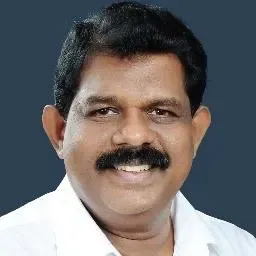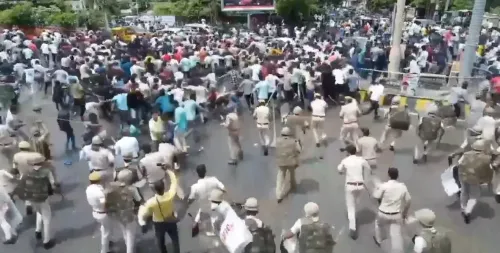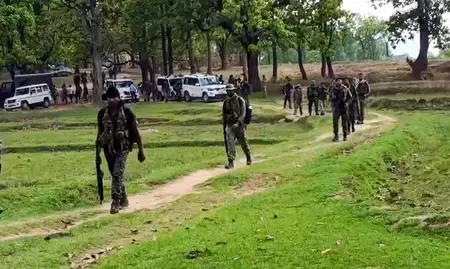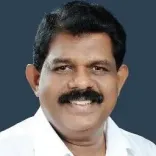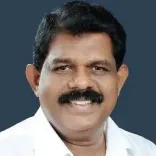Is India Truly Committed to a Zero Tolerance Against Terrorism?
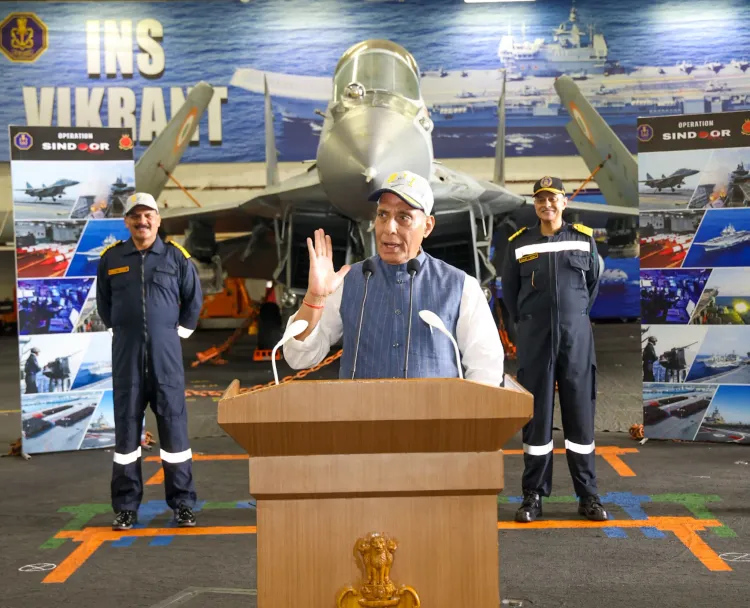
Synopsis
Key Takeaways
- India's zero tolerance stance against terrorism is reaffirmed by Defence Minister Rajnath Singh.
- The call for global cooperation highlights the international responsibility to combat terrorism.
- India's proactive military measures include surgical strikes and Balakot strikes.
- Singh emphasizes the need for a comprehensive definition of terrorism.
- Pakistan's role in sponsoring terrorism remains a critical issue.
New Delhi, June 7 (NationPress) Defence Minister Rajnath Singh emphasized India's unwavering position of zero tolerance towards terrorism and urged the international community to eradicate this menace. In a message shared on the social media platform X, Union Minister Singh stated that combating terrorism is not merely a choice but a collective obligation.
The Defence Minister also referred to an article he penned for an English daily, outlining strategies to combat the scourge of terrorism.
He pointed out that for many years, India has suffered from state-sponsored, cross-border terrorism emanating from Pakistan, citing incidents like the 26/11 attacks, the 2001 Parliament attack, and the recent Pahalgam assault. Yet, India remains resilient, standing tall and determined.
“We have demonstrated how to combat terrorism,” Rajnath Singh asserted, offering guidance to the global community on this pressing issue.
Highlighting that the currency of terrorism is fear, he noted how attempts to disrupt India's unity have consistently failed.
The Pahalgam attack specifically targeted individuals based on their religion, as did various assaults on places of worship of different faiths, all aimed at sowing discord within the nation, but these efforts were in vain.
He reiterated the NDA government's position that any future dialogue with Pakistan will focus solely on terrorism and the issue of Pakistan-occupied Kashmir.
Stressing that negotiations and terrorism cannot coexist, Rajnath Singh urged that if Pakistan is genuine, it must extradite UN-designated terrorists like Hafiz Saeed and Masood Azhar.
The leader highlighted a significant shift in India's approach to Pakistan-sponsored terrorism, stating, “Previously, our armed forces were restricted to defensive actions; now, we conduct surgical strikes, Balakot strikes, and Operation Sindoor.”
He declared that any terrorist act is now regarded as an act of war, asserting, “We will eliminate terrorists at their source.”
Rajnath Singh warned that Pakistan would face consequences if it fails to control terrorists operating from its territory. He echoed PM Modi's commitment that India will not rest until terrorism is eradicated.
He mentioned India's successful diplomatic isolation of Pakistan and the suspension of the Indus Water Treaty until Pakistan credibly renounces its support for cross-border terrorism.
To effectively dismantle terrorist networks, he called for a universally accepted definition of terrorism for the investigation and prosecution of terrorist acts, along with the assurance of terrorists' extradition from abroad.
He insisted that donor nations and multilateral organizations must cease funding states that sponsor terrorism.
Rajnath Singh pointed out Pakistan's history of misusing bailout funds for cross-border terrorism, advocating that it be placed back on the grey list by the Financial Action Task Force (FATF).
He emphasized the intertwined nature of state and non-state actors in Pakistan, exemplified when designated terrorists were honored with state funerals.
Additionally, he cautioned about the potential threat of nuclear weapons falling into the hands of non-state actors and called for international oversight of Pakistan's nuclear arsenal by the International Atomic Energy Agency.
He stressed that the severity of responses to terrorist acts should not depend on their location or the nationality of the victims, as this emboldens perpetrators.
“It’s imperative for all nations to unite and endorse the Comprehensive Convention against International Terrorism,” Rajnath Singh concluded.


